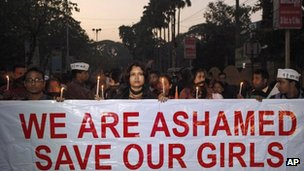Should India lower the age of consent?
- Published
- comments

There have been demands for tougher anti-rape laws
India's government has reportedly cleared lowering the age of consent for sex, external to 16 years.
This comes after increasing it to 18 in a tough anti-rape ordinance following the outrage after the fatal gang rape of a student in Delhi last December.
Raising the age of consent to 18 has placed India among the more orthodox countries in a world where the norm and the global average, external is around 16 years.
Many believe that raising the age of consent is fraught with risks.
India is a divided and hierarchical society where relationships between men and women belonging to different castes, classes and religions can spark violence and feuds. Sex before marriage remains taboo.
Nevertheless, India's young are more sexually active than ever before. A 2007 study, external by the International Institute for Population Sciences and the Population Council found that more than 42% of men and 26% of women aged 15-24 in relationships had sex with their partner.
Many fear that a higher age of consent could lead to young men being packed off to reform homes on the basis of complaints by the irate parents of the young women.
Last year, a judge in Delhi expressed fears, external that such a move would "open the floodgates for the prosecution of boys for offences of rape on the basis of complaints by girls' parents [even if] the girl was a consenting party".
Also, as leading women's right's lawyer Flavia Agnes points out, a third of rape cases, external in India are filed by parents against boys with whom their daughters have eloped.
"All that raising the age of consent to 18 years will do is to give society greater control over the lives of young people and young boys in consensual relations with girls," says lawyer Vrinda Grover.
Raising the age of consent can have other unfortunate consequences.
Many young people rush into marriage quickly as it is widely considered to be sanction for having "legal" sex.
Many of these marriages fall apart quickly as their partners are mentally not prepared for it. A large number of girls aged 15-18 are also kidnapped for marriage.
Supporters of a higher age of consent for sex argue that those under 18 are not prepared to handle sexual relations.
They say a higher consent age also checks widespread child abuse, teenage pregnancies, human trafficking and rape.
Over a century the age of consent in India has been raised from 10 to 18 reacting mainly to concerns over child marriage, and much later over rape and teenage pregnancies.
Still, according to the National Population Policy, over 50% of girls marry below the age of 18. Conflating age of marriage for girls (18) with age of consent, says researcher Pallavi Gupta "negates any form of sexual freedom that young girls below that age group can exercise".
But clearly, India needs to do more to protect its girls and stop child marriages than raise the age of consent.